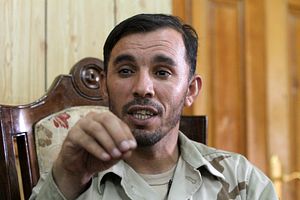Two days before Afghans head to the polls, an assassination in Kandahar has plunged southern Afghanistan into crisis.
Details of what happened at the provincial governor’s compound in Kandahar city on Thursday continue to emerge. Initial reports indicate that at least one gunman, allegedly a member of the provincial governor’s bodyguards, shot and killed the region’s top police official, Gen. Abdul Raziq, and the provincial intelligence chief, Abdul Momin. There have also been reports that a cameraman for Afghanistan State TV, Mohammad Salim Angar, was also killed.
The provincial governor, Zalmai Wesa, was injured as was a regional army commander, Nabi Elham. As of writing, TOLO News has reported that Wesa — who earlier reports claimed had been killed — was out of surgery and in stable condition.
Two Americans were injured in the attack (earlier reports put the number at three; the third was apparently a member of the NATO coalition but not from the United States). But the top American commander in Afghanistan, Gen. Austin S. Miller, who was present, escaped the attack, which took place after a meeting about election security.
The Taliban claimed responsibility for the attack, specifically stating that the targets were Raziq and Miller.
Raziq, 39, was one of Afghanistan’s most powerful figures. Seen as a close U.S. ally and a fervent enemy of the Taliban, Raziq was also deeply controversial. In 2017, the UN Committee Against Torture recommended that Raziq be prosecuted over allegations of torture and enforced disappearance.
Speaking to The Guardian, Graeme Smith, an analyst with the International Crisis Group, said “Raziq’s rise as the most powerful man in southern Afghanistan brought with it a kind of grim dystopian security to Kandahar city… He was a larger than life charismatic military figure who had escaped death so many times that he wore an aura of invincibility. The Taliban had been making slow territorial advances [in Kandahar], and his death will accelerate the pace.”
The attack comes at a time of deepening instability in Afghanistan and grave concerns for the rapidly approaching nationwide parliamentary election. Already, at least 10 candidates have been killed ahead of the election and while the Afghan government has promised to deploy 54,000 soldiers to protect the polls the Taliban has vowed to disrupt the election.
By next week, the assassination of Raziq may turn out to simply have been the opening salvo.
































